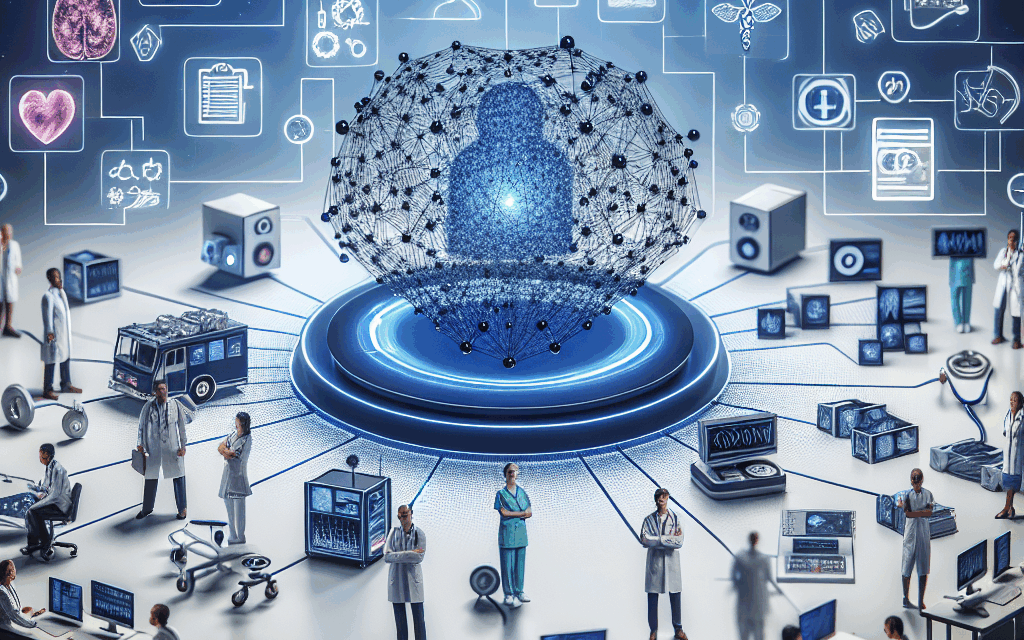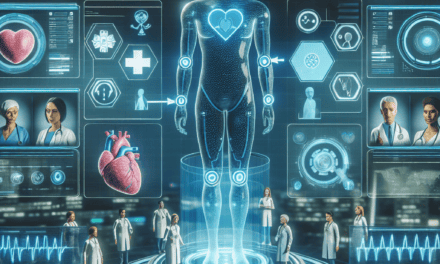The Role of Machine Learning in Healthcare: Exploring Its Impact and Importance
Machine learning (ML) has emerged as a transformative force in various sectors, and healthcare is no exception. The integration of machine learning technologies into healthcare systems is revolutionizing how medical professionals diagnose, treat, and manage diseases. This article delves into the multifaceted role of machine learning in healthcare, exploring its impact and importance through five key subtopics: predictive analytics, personalized medicine, medical imaging, operational efficiency, and patient engagement.
1. Predictive Analytics: Anticipating Health Outcomes
Predictive analytics in healthcare involves using machine learning algorithms to analyze historical data and predict future health outcomes. This capability is crucial for early intervention and preventive care, allowing healthcare providers to identify at-risk patients and implement timely interventions.
Machine learning models can analyze vast amounts of patient data, including demographics, medical history, and lifestyle factors, to identify patterns that may indicate a higher risk of developing certain conditions. For instance, a study published in the journal *Nature* demonstrated that machine learning algorithms could predict the onset of diabetes with an accuracy of over 80% by analyzing electronic health records (EHRs) and lifestyle data.
- Risk Stratification: Machine learning can stratify patients based on their risk levels for various diseases. For example, algorithms can identify patients at high risk for heart disease by analyzing factors such as cholesterol levels, blood pressure, and family history.
- Early Detection: Predictive models can facilitate early detection of diseases like cancer. For instance, ML algorithms have been used to analyze mammogram images to identify potential tumors before they become clinically evident.
- Chronic Disease Management: Machine learning can help manage chronic diseases by predicting exacerbations and hospitalizations. For example, algorithms can analyze data from wearable devices to predict asthma attacks, allowing for timely interventions.
Moreover, predictive analytics can enhance population health management by identifying trends and outbreaks. During the COVID-19 pandemic, machine learning models were employed to predict infection rates and optimize resource allocation, demonstrating the technology’s potential in crisis situations.
2. Personalized Medicine: Tailoring Treatments to Individuals
Personalized medicine, also known as precision medicine, aims to customize healthcare treatments based on individual patient characteristics. Machine learning plays a pivotal role in this approach by analyzing genetic, environmental, and lifestyle factors to determine the most effective treatment plans.
One of the most significant applications of machine learning in personalized medicine is in oncology. By analyzing genomic data, machine learning algorithms can identify specific mutations in cancer cells and recommend targeted therapies. For instance, the use of ML in analyzing tumor genomics has led to the development of drugs that specifically target mutations in breast cancer, significantly improving patient outcomes.
- Genomic Data Analysis: Machine learning algorithms can process vast amounts of genomic data to identify biomarkers associated with specific diseases. This capability allows for the development of targeted therapies that are more effective and have fewer side effects.
- Drug Discovery: Machine learning accelerates the drug discovery process by predicting how different compounds will interact with biological targets. This approach has led to the identification of promising drug candidates in a fraction of the time compared to traditional methods.
- Clinical Decision Support: Machine learning can assist healthcare providers in making informed decisions about treatment options. By analyzing patient data and treatment outcomes, ML algorithms can recommend the most effective therapies for individual patients.
The success of personalized medicine hinges on the ability to integrate diverse data sources, including genetic information, clinical data, and patient-reported outcomes. As machine learning continues to evolve, its role in personalized medicine is expected to expand, leading to more effective and tailored treatment strategies.
3. Medical Imaging: Enhancing Diagnostic Accuracy
Medical imaging is a critical component of modern healthcare, providing essential insights into a patient’s condition. Machine learning has significantly enhanced the accuracy and efficiency of medical imaging by automating image analysis and improving diagnostic capabilities.
Machine learning algorithms, particularly deep learning techniques, have shown remarkable success in interpreting medical images such as X-rays, MRIs, and CT scans. For example, a study published in *JAMA Oncology* found that a deep learning model could detect breast cancer in mammograms with an accuracy comparable to that of experienced radiologists.
- Automated Image Analysis: Machine learning algorithms can automate the analysis of medical images, reducing the time required for diagnosis. This automation allows radiologists to focus on more complex cases and improves overall workflow efficiency.
- Improved Detection Rates: ML models can enhance detection rates for various conditions, including tumors and fractures. For instance, algorithms have been developed to identify lung nodules in chest X-rays, leading to earlier diagnosis and treatment.
- Integration with EHRs: Machine learning can integrate imaging data with electronic health records, providing a comprehensive view of a patient’s health status. This integration facilitates more accurate diagnoses and treatment planning.
As machine learning continues to advance, its applications in medical imaging are expected to expand further. The potential for real-time analysis and decision support will enhance diagnostic accuracy and improve patient outcomes.
4. Operational Efficiency: Streamlining Healthcare Processes
Operational efficiency is crucial for healthcare organizations to deliver high-quality care while managing costs. Machine learning can optimize various operational processes, from scheduling appointments to managing supply chains, ultimately improving the overall efficiency of healthcare systems.
One of the key areas where machine learning can enhance operational efficiency is in patient flow management. By analyzing historical data on patient admissions, discharges, and transfers, machine learning algorithms can predict patient volumes and optimize staffing levels accordingly. This capability helps reduce wait times and improve patient satisfaction.
- Resource Allocation: Machine learning can optimize resource allocation by predicting demand for services. For example, algorithms can analyze data on seasonal illness patterns to ensure adequate staffing and resources during peak times.
- Supply Chain Management: Machine learning can enhance supply chain management by predicting inventory needs based on patient demand and historical usage patterns. This optimization reduces waste and ensures that essential supplies are always available.
- Telemedicine Optimization: With the rise of telemedicine, machine learning can help optimize virtual care delivery by analyzing patient data to determine the most appropriate care pathways and follow-up schedules.
By streamlining operational processes, machine learning not only improves efficiency but also enhances the overall patient experience. As healthcare organizations continue to adopt these technologies, the potential for improved operational efficiency will only grow.
5. Patient Engagement: Empowering Individuals in Their Healthcare Journey
Patient engagement is a critical aspect of modern healthcare, as empowered patients are more likely to adhere to treatment plans and make informed decisions about their health. Machine learning can enhance patient engagement by providing personalized information and support throughout the healthcare journey.
Machine learning algorithms can analyze patient data to deliver tailored health recommendations and reminders. For instance, mobile health applications powered by machine learning can provide personalized exercise and nutrition plans based on individual health data, encouraging patients to take an active role in their health management.
- Personalized Communication: Machine learning can facilitate personalized communication between healthcare providers and patients. By analyzing patient preferences and behaviors, algorithms can determine the most effective communication channels and messages.
- Behavioral Insights: Machine learning can analyze patient behavior patterns to identify barriers to adherence and engagement. This insight allows healthcare providers to tailor interventions that address specific challenges faced by patients.
- Remote Monitoring: With the rise of wearable devices, machine learning can analyze real-time health data to provide patients with feedback on their health status. This continuous monitoring empowers patients to make informed decisions about their care.
As healthcare continues to evolve, the role of machine learning in enhancing patient engagement will become increasingly important. By empowering patients with personalized information and support, healthcare providers can foster a more collaborative and effective healthcare experience.
Conclusion: The Future of Machine Learning in Healthcare
The integration of machine learning into healthcare is transforming the industry, offering innovative solutions that enhance patient care, improve operational efficiency, and empower individuals in their health journeys. From predictive analytics that anticipate health outcomes to personalized medicine that tailors treatments to individual needs, the impact of machine learning is profound and far-reaching.
As we look to the future, the continued advancement of machine learning technologies will likely lead to even more significant breakthroughs in healthcare. The potential for improved diagnostic accuracy, streamlined operations, and enhanced patient engagement presents exciting opportunities for healthcare providers and patients alike.
In summary, the role of machine learning in healthcare is not just a trend; it is a fundamental shift that is reshaping how we approach health and wellness. By harnessing the power of machine learning, we can create a more efficient, effective, and patient-centered healthcare system that ultimately leads to better health outcomes for all.





